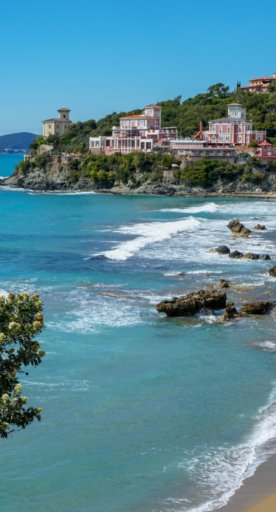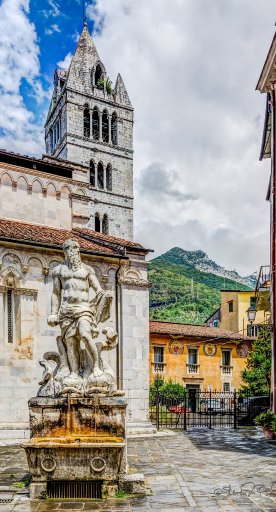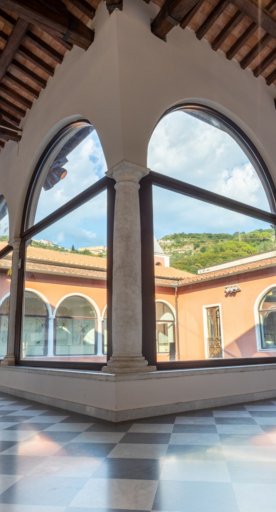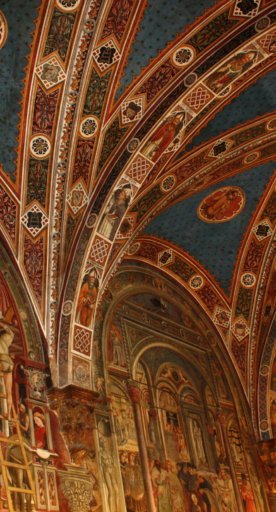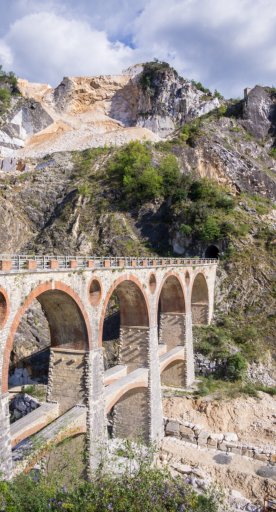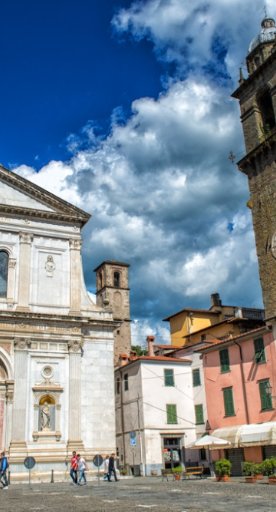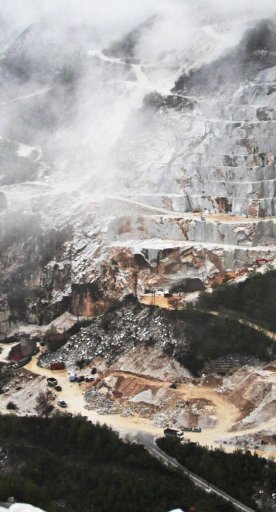

The Riviera Apuana’s most popular places on Instagram
From the Apuan Alps to the waterfront, from historic centers to natural oases, from castles to murals, here is a guide to the most photographed places
A wonderful territory that stretches from sea to mountains and holds within it precious places, big and small gems to photograph. Let's discover together which are the most "instagrammed" places of the Riviera Apuana Terra Scolpita.
-
1.Campocecina
-
2.Ponti di Vara
-
3.Colonnata
-
4.Mural by Eduardo Kobra
-
5.Impollinèmesi
-
6.Piazza Alberica
-
7.Piazza Aranci
-
8.Malaspina Castle
-
9.Botanical Garden of the Apuan Alps
-
10.Pasquilio
-
11.Lago di Porta
-
12.The piers
-
13.Fiat Tower
-
14.The Vele in Piazza Bad Kissingen
Campocecina

Let's start from the mountains: at the foot of the peaks in the surroundings of Carrara and just above the spectacular marble quarries, a half-hour drive from town takes you to the meadows of Campocecina. A starting point for hiking trails, peaks and refuges, the wide green expanse of meadows and woods offers a breath-taking panoramic view of the city of Carrara and the surrounding landscape. In fact, the highlight and inescapable point is precisely the unusual scenery that awaits us: by turning 360° on ourselves, we can enjoy a view that goes from the crown of mountains, the Apuan Alps, to the spectacular marble quarries, to the valley around the town and the sea. On clearer days it is even possible to glimpse Corsica and the islands of Elba and Capraia on the horizon. What better scenery for a shot?
Ponti di Vara

Those who love the spectacle of marble quarries cannot miss the Ponti di Vara. A witness to the past, the bridges are what remains of the marble railway built in the second half of the 19th century to connect the quarries directly to the port of Marina di Carrara, passing through the areas of San Martino and Avenza. These very tall buildings are the remains of over 20 kilometers of railroad, partially destroyed by wartime bombing and then finally closed in the 1960s. Today they are an evocative place, a scenic and panoramic attraction.
Colonnata

Continuing on the "via delle Cave," we arrive in Colonnata, the village of marble and lard. Strolling through the village we encounter not only stores and workshops where we can taste the sliced meat typical of Carrara, but also stone houses, open-air restaurants, monuments and viewpoints overlooking the mountains. And it is in the courtyard in front of the chiesa di San Bartolomeo (church of St. Bartholomew) that we will get our best shot, where the quarries set the scene for the complex of marble sculptures dedicated to the quarryman.
Mural by Eduardo Kobra

From Colonnata, taking a beautiful trekking route, we arrive at the Cava di Gioia (Gioia Quarry), where the colorful mural created by Brazilian artist Eduardo Kobra is located. The painting depicts the face of the famous David by Michelangelo, reinterpreted with geometric designs that distinguish the writer's style, and pays homage to the great Renaissance master by placing it in the very place where, over five hundred years ago, he extracted the white for his most famous sculptures. Of grand proportions, over ten meters by ten, surrounded by the extraordinary landscape of the Apuan Alps and overlooking the sea and the city of Carrara, the mural stands out against the white marble of the quarry, the perfect backdrop for beautiful photos.
Impollinèmesi

And speaking of murals, our photo gallery cannot miss the latest arrival: in Carrara, on the steps of Monterosso, the first multimedia eco-mural in Italy, entitled Impollinèmesi, has been created. The painting, by street artist Zed1, pays homage to bees by trying to raise awareness of the vital importance of these splendid insects in our ecosystem, and is accompanied by sound interventions by soundesigner Alessio Mosti – that you can listen to by framing a QR code - and sculptures by Silvia Scaringella. This is a beautiful project, brought to light by the social promotion association A.p.s. in collaboration with the non-profit Yourban2030, the Academy of Fine Arts, the Municipality of Carrara, the Marble Foundation and the scientific advice of beekeeper Martina Bigi.
Piazza Alberica

Walking a few steps, we come to one of the most beautiful squares of the Riviera Apuana: Piazza Alberica. Rectangular in shape, Carrara's square, once Platea Porcorum, or place of the cattle market, is today the fulcrum of town life, the location of major artistic and cultural events. It is overlooked by important stately palaces from the Renaissance and Baroque periods, such as the Palazzo delle Logge and the Palazzo del Medico, the birthplace of Pietro Tacca, and many others. In the center stands a fountain with a basin, surmounted by a large statue of Duchess Maria Beatrice d'Este, inspired by the iconography of Juno.
Piazza Aranci

Another very large and wonderful square on the Riviera Apuana is Piazza Aranci, in the heart of the city of Massa. The square owes its name to the presence of orange trees, characteristic of the city, which surround it on three sides, while the beautiful Palazzo Ducale overlooks the fourth side. In the center of the square stands the obelisk with the four lions positioned in the direction of the cardinal points, crouching to guard passersby. In addition to being one of the most beautiful city views, the square is a crossroads from which the most important streets of the historic town center branch off. Many scholars wrote about this place and it was highly appreciated by the poets Leopardi and Carducci.
Malaspina Castle

Just above the residential area of Massa, the Malaspina Castle dominates the town from a hilltop, easily reached on foot from the historic town center by walking up the so-called "piastronata" that starts from Piazza Mercurio in a scenic and evocative walk. A fortification of medieval origin, it was later named in the 15th century after the Cybo-Malaspina dynasty, the lords of Massa. The inside of the castle features remarkable frescoes as well as Renaissance sculptures and marble decorations in the rooms and the chapel of the palace. From the castle there is a splendid view of the city all the way to the sea, ideal for romantic shots even at night, with the lights of the city as a backdrop.
Botanical Garden of the Apuan Alps

Let us now move on to the mountainous area of Massa, locality Pian della Fioba: the wonderful "Pellegrini-Ansaldi" Botanical Garden is very interesting not only because it is part of the Regional Park of the Apuan Alps and because of the presence of many species of wild plants, but also for its privileged location, overlooking the sea and the mountains that, at a particular time of the year, are tinged with red. There are many initiatives held within the garden, including educational activities dedicated to schools and the inevitable visit to discover its rich flora. Pines, firs, alders... but also many varieties of flowers and shrubs! During the fall season a visit and taking advantage of the warm sunsets are a must.
Pasquilio

Staying at high altitude, we move to the municipality of Montignoso, to the area called Pasquilio, at the foot of the Folgorito and Carchio mountains, strongholds of the Gothic line in the Apuan Alps. A small rural, stone church was built here, begun in 1943 but not completed until after the war. Dedicated to Our Lady and to the resistance patriot Pietro Del Giudice, the little church stands as a votive temple of the Apuan resistance, as well as a place of faith, and is located at a special vantage point, in the middle of a vast meadow overlooking the valley and the sea, while behind it the mountains surround it.
Lago di Porta

We descend to the valley and visit Lago di Porta, an ideal place to spend a relaxing afternoon surrounded by nature. A true wildlife oasis, the lake is a protected natural area with a wide variety of vegetation and environments where you can meet and photograph many animal species, especially birds. This is precisely the best time to practice birdwatching: around dusk the sky fills with flocks into a show that is choreographic, to say the least.
The piers

If it is true that the characteristic of the Riviera Apuana is the coexistence of sea and mountains, what better place than the Pier of Marina di Massa to enjoy both landscapes? A walk on the water surrounded by a mountain landscape is precisely the reason why the pier is so crowded, especially in summer evenings. The end, a kind of small square, is often the stage for musicians and street performers whose music makes the atmosphere even more evocative as the moon is reflected in the sea. From vantage point to protagonist of wonderful shots, the piers in the area lend themselves to being photographed from the beach, particularly at sunset or dusk. Even the Pontile del Cinquale, although you cannot walk along it, offers fascinating moments all deserving of a shot.
Fiat Tower

On the list of the most featured shots in tourist reports is the Fiat Tower in Marina di Massa: a tower by the sea that dominates and makes the skyline of the Apuan coast unique. A prime representative of the historic colonies of the 1930s: the former Fiat Colony now Torre Marina opened on July 23, 1933. The seventeen-story tower, 52 meters high, is often the protagonist of amateur and professional shots. The highly complex construction, consisting of several floors on top of each other, houses inside a helicoidal ramp of great scenic impact.
The Vele in Piazza Bad Kissingen

The “Vele di Marmo” (Marble Sails) in Marina di Massa welcome year-round visitors to one of the beach-facing terraces of the Riviera Apuana. They soar arge and majestic in Piazza Bad Kissingen giving us unique shots and evocative night time photos illuminated by plays of light. An "archisculpture" that seems to defy the mountains, the sky and the sea.







